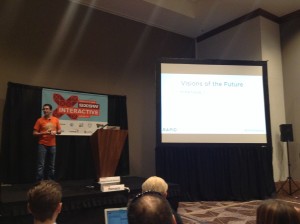
By now, we’ve all heard of the “Internet of Things” (if you haven’t, educate yourself because it is the future), but what exactly will keep our “things” safe from hackers? In his Friday SXSW Interactive session, Nicholas Percoco, VP of Strategic Services at Rapid7, explained what the government is doing, what the industry has done, and what you can do to stay safe in the age of internet-connected everything.
After describing the evolution of his own technology journey through the 80s, Percoco explained how we often don’t consider technology as being “dangerous.” While risks have always been existent with any technology, such as hearing damage from Walkmans, today’s internet technology presents a new world of potential pitfalls, not the least of which is security.
To really get a picture of what the Internet of Things (IoT) will look like one day, Percoco asked his audience to close their eyes while he narrated a theme park ride experience touring our world 50 years from now. Along with futuristic played music reminiscent of a sci-fi film, he brought us into a world of robotic arms, self-driving cars, digital telepathy and even mind farms (I couldn’t describe this if I tried).
Percoco then went through this fantastical world and analyzed possible risks involved with each technology. For example: imagine hacking a person’s bionic arm or causing someone to veer off the road. He concluded that because most of our future technology will have to do with human life and public safety, its security is of vital importance.
So, What Is Being Done?
Though the days of internet-connected, autonomous physicians aren’t here yet, the world Percoco described could very well be on its way. So, what is being done to proactively secure these systems now? Among other practices, large companies actually provide incentives for everyday hackers to find problems with their systems or hardware. These “bug bounty programs” are just one way the industry is trying to combat the issue of security breaches. Even the government is attempting to fight internet problems by creating new legislation and requiring certain standards for software and companies.
What Can I Do?
As for consumers, Percoco said it’s important for everyone to update their devices as much as possible. Simply informing someone of the importance of updating their operating systems or even the firmware on their internet-connected devices can curb many hacks. He even encouraged people to “vote for security” with their money by buying devices with security already baked in and supporting companies that value security.
So, who will save us? No one and everyone. Each person, entity, organization and government is responsible for their own security, but getting informed is the first step.

Permalink
Wish I could have gone to this one!